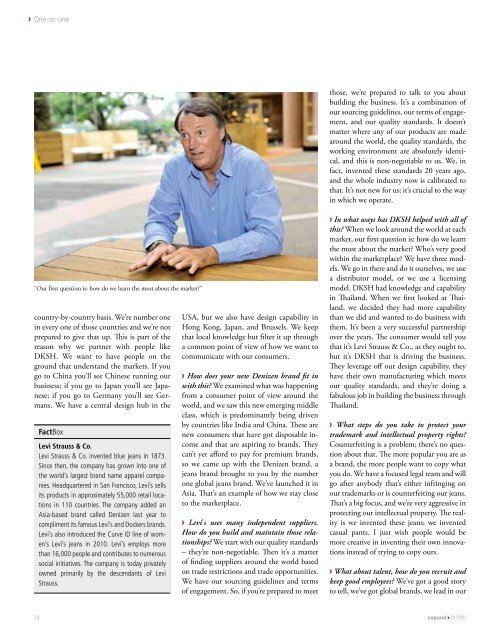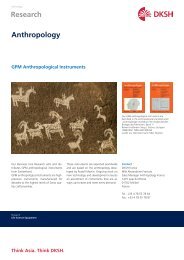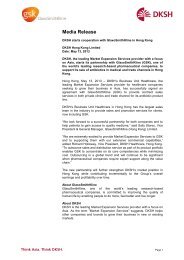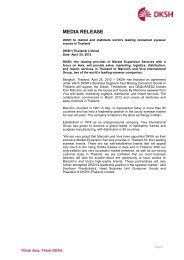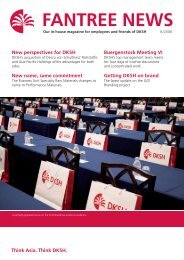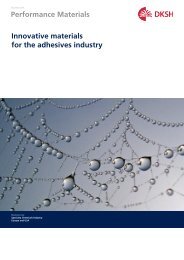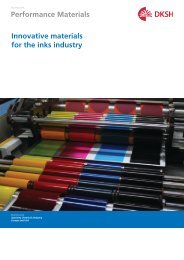Create successful ePaper yourself
Turn your PDF publications into a flip-book with our unique Google optimized e-Paper software.
One-on-onethose, we’re prepared to talk to you aboutbuilding the business. It’s a <strong>com</strong>bination ofour sourcing guidelines, our terms of engagement,and our quality standards. It doesn’tmatter where any of our products are madearound the world, the quality standards, theworking environment are absolutely identical,and this is non-negotiable to us. We, infact, invented these standards 20 years ago,and the whole industry now is calibrated tothat. It’s not new for us; it’s crucial to the wayin which we operate.“Our first question is: how do we learn the most about the market?”country-by-country basis. We’re number onein every one of those countries and we’re notprepared to give that up. This is part of thereason why we partner with people like<strong>DKSH</strong>. We want to have people on theground that understand the markets. If yougo to China you’ll see Chinese running ourbusiness; if you go to Japan you’ll see Japanese;if you go to Germany you’ll see Germans.We have a central design hub in theFactBoxLevi Strauss & Co.Levi Strauss & Co. invented blue jeans in 1873.Since then, the <strong>com</strong>pany has grown into one ofthe world’s largest brand name apparel <strong>com</strong>panies.Headquartered in San Francisco, Levi’s sellsits products in approximately 55,000 retail locationsin 110 countries. The <strong>com</strong>pany added anAsia-based brand called Denizen last year to<strong>com</strong>pliment its famous Levi’s and Dockers brands.Levi’s also introduced the Curve ID line of women’sLevi’s jeans in 2010. Levi’s employs morethan 16,000 people and contributes to numeroussocial initiatives. The <strong>com</strong>pany is today privatelyowned primarily by the descendants of LeviStrauss.USA, but we also have design capability inHong Kong, Japan, and Brussels. We keepthat local knowledge but filter it up througha <strong>com</strong>mon point of view of how we want to<strong>com</strong>municate with our consumers.How does your new Denizen brand fit inwith this? We examined what was happeningfrom a consumer point of view around theworld, and we saw this new emerging middleclass, which is predominantly being drivenby countries like India and China. These arenew consumers that have got disposable in<strong>com</strong>eand that are aspiring to brands. Theycan’t yet afford to pay for premium brands,so we came up with the Denizen brand, ajeans brand brought to you by the numberone global jeans brand. We’ve launched it inAsia. That’s an example of how we stay closeto the marketplace.Levi’s uses many independent suppliers.How do you build and maintain those relationships?We start with our quality standards– they’re non-negotiable. Then it’s a matterof finding suppliers around the world basedon trade restrictions and trade opportunities.We have our sourcing guidelines and termsof engagement. So, if you’re prepared to meetIn what ways has <strong>DKSH</strong> helped with all ofthis? When we look around the world at eachmarket, our first question is: how do we learnthe most about the market? Who’s very goodwithin the marketplace? We have three models.We go in there and do it ourselves, we usea distributor model, or we use a licensingmodel. <strong>DKSH</strong> had knowledge and capabilityin Thailand. When we first looked at Thailand,we decided they had more capabilitythan we did and wanted to do business withthem. It’s been a very successful partnershipover the years. The consumer would tell youthat it’s Levi Strauss & Co., as they ought to,but it’s <strong>DKSH</strong> that is driving the business.They leverage off our design capability, theyhave their own manufacturing which meetsour quality standards, and they’re doing afabulous job in building the business throughThailand.What steps do you take to protect yourtrademark and intellectual property rights?Counterfeiting is a problem; there’s no questionabout that. The more popular you are asa brand, the more people want to copy whatyou do. We have a focused legal team and willgo after anybody that’s either infringing onour trademarks or is counterfeiting our jeans.That’s a big focus, and we’re very aggressive inprotecting our intellectual property. The realityis we invented these jeans; we inventedcasual pants. I just wish people would bemore creative in inventing their own innovationsinstead of trying to copy ours.What about talent, how do you recruit andkeep good employees? We’ve got a good storyto tell, we’ve got global brands, we lead in our24 <strong>expand</strong> 01/2011


